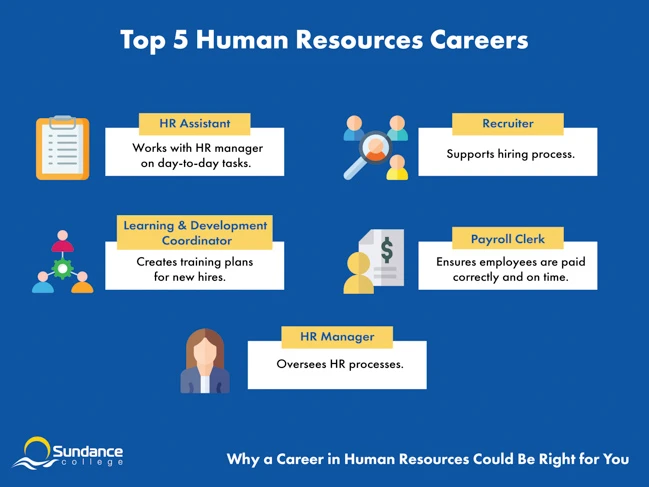Blog / Why a Career in Human Resources Could Be Right for You
Why a Career in Human Resources Could Be Right for You

Human Resources Management Diploma
- Human Resources Advisor
- Recruitment Officer
- Pay and Benefits Administrator
- Human Resources Coordinator
Table of Contents
When you imagine finding an exciting and fulfilling new job, does a human resources career come to mind? If you love solving problems, developing processes, and – most importantly – helping people, then perhaps it should.
Human resources professionals have significant influence over workplace culture and employee satisfaction. From attracting new hires to creating opportunities for professional development, this career empowers employees and organizations to reach their full potential.
Keep reading to learn about the day-to-day responsibilities of an HR professional and how to launch your HR career.
What Does HR Do?

HR is responsible for the most valuable resource any organization has – its employees. Human resources departments handle processes for every stage of the employee lifecycle, by hiring, training, and retaining talent.
Ultimately, human resources teams ensure that employees fulfill the needs of the company, which in turn means keeping employees motivated, engaged, and productive. A strong human resources strategy is vital to the success of the business. Therefore, it’s important for HR professionals to understand business fundamentals, like financial planning and organizational behaviour.
Key Areas Of Human Resources
Recruitment
Psychologist Benjamin Schneider famously claimed, “the people make the place,” and this quote has remained a popular mantra among HR professionals. The human resources team has the important task of recruiting top talent for open roles. Often in partnership with the hiring manager, HR creates job postings, selects applicants to interview, and extends job offers to successful candidates.
Training and Development
The HR team oversees training for new hires and professional development for employees, which includes workshops, conferences, and other certifications. Ongoing education helps employees advance in their careers, improving morale and decreasing turnover. In fact, research by LinkedIn has found that “94% of employees would stay at a company longer if it invested in their career.”
Compensation and Benefits
The responsibility of paying people correctly and on time, as well as managing their health insurance packages, often falls within the scope of HR. Human resources may also be responsible for a company’s compensation structure – establishing how much employees are paid and whether they receive bonuses or commissions.
Compliance
The HR team helps employers and employees comply with labour laws, regulatory rules, and other legislation by creating, enforcing, and updating workplace policies. For example, your workplace may require you to use a company issued laptop, a policy put in place to protect confidential information.
Diversity and Inclusion
As a department dedicated to creating a safe and fair work environment, HR must advocate for diversity and inclusion at every stage of the employee lifecycle. Therefore, many organizations employ diversity and inclusion specialists within the HR team.
Employee Relations
Employee relations involves mediating between employees and employers to resolve disputes, record complaints, and enforce company policies. An important part of employee relations is letting employees know they’re valued. When an employee feels heard and respected, they’re more motivated to do their best work.
What Are My HR Career Options?

The field of human resources offers a diverse range of career options, with lots of opportunity to grow into a leadership position or specialized role. Most people begin their HR career with an entry-level job, like a human resources assistant. There are opportunities to advance in this career after a number of years and some experience.
Here are 5 popular jobs in HR:
- Human Resources Assistant – Works with HR managers to update employee records, create reports, resolve conflicts, and complete other generalized tasks.
- Recruiter – Supports the hiring process by developing a recruiting strategy, managing job postings, and tracking hiring costs.
- Learning and Development Coordinator – Creates and implements training plans for new hires.
- Payroll Clerk – Completes day-to-day payroll duties like recording employee hours and banking information, creating pay slips, and correcting system errors.
- Human Resources Manager – Oversees HR processes while managing assistants and coordinators.
What Skills Do I Need to Work in HR?

You don’t need to be an extrovert to work in HR. However, you should probably be interested in people: what motivates them, what prevents them from doing their best work, and how organizations can support their needs. Overall, the best HR professionals are empathetic communicators who can apply their understanding of human behavior at a strategic level.
If you want to pursue a career in human resources, you’ll also need following skills:
- Written and Oral Communication – It’s important that HR professionals express themselves clearly and professionally, whether they’re sending an email or listening to employee concerns.
- Strategic Thinking – Decisions like which job candidate to hire, how to train new employees, and ways to boost morale should be made strategically, with company values and goals in mind.
- Time Management – HR professionals may handle a wide range of tasks in one day, from recruiting to compliance. Therefore, efficient time management is an essential skill.
- Budgeting – HR professionals (especially recruiters) will need to work within the company budget.
- Conflict Resolution – HR professionals mediate between employers and employees, finding solutions that benefit the entire organization.
Are HR Jobs in Demand in Canada?
Human resources jobs are high in demand in Canada – especially in Alberta, Manitoba, Quebec, and Ontario.
This career field offers great flexibility and choice. Because most organizations need an HR department, human resources professionals can find job opportunities in many different industries, from business and tech to arts and culture. Depending on your professional goals, you may choose to work for a small business as a human resources generalist, whose work touches on multiple areas of HR. Or, you may decide to pursue a more specialized role, within a large department.
Is Human Resources a Good Career?

If making a difference in the world is important to you, then human resources is a great career choice with many career paths and potential for growth.
Working in human resources means you have the power to support employees – and make a positive impact on company culture. Additionally, the work you do on an HR team will equip you with a versatile skillset, which you can easily apply to other roles and departments.
How to Start Your HR Career
Ready to launch your career? The Sundance College General Business Management Diploma program will prepare you for an HR role with courses on human resources fundamentals and other business essentials. Taught by experienced professionals, you’ll graduate from the GBM program with a holistic understanding of business operations – essential knowledge for an HR professional.
We also offer the Accounting, Tax, and Payroll Diploma program, which will prepare you for a career in payroll administration and other financial roles.
Click here to speak with an admissions advisor about a career in human resources.
Related Blogs
Subscribe for more career advice
Blog Categories
Share on:
